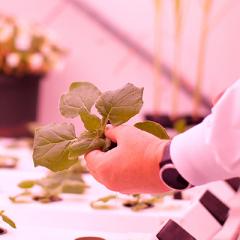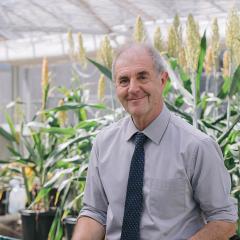Plants and animals make mini-proteins called peptides. They are very potent and very specific in what they do, which makes them ideal candidates for drug development. They would be very effective and have minimal side effects, but for one problem – the body thinks they are food.
Peptides produced within our bodies are finely regulated, but those taken by mouth are ripe for destruction, since that is the normal job of our digestive system.
Our bodies can’t tell the difference between the peptides in say a steak and an insulin tablet, if such a thing existed. Our bodies have evolved to break peptides down quickly to form amino acids.
Group leader

Professor David Craik
Group Leader, Protein structure in drug and insecticide design
Director, ARC Centre of Excellence for Innovations in Peptide and Protein Science
Director, Clive and Vera Ramaciotti Facility for Producing Pharmaceuticals in Plants
+61 7 3346 2019
d.craik@imb.uq.edu.au
UQ Experts Profile
Clive and Vera Ramaciotti Facility for Producing Pharmaceuticals in Plants
The Craik Group are re-engineering and adapting peptides to create new drugs, and their methodology is working. They have also had success in an unrelated field where peptides are also important, using the methodology to create agri-chemicals, helping the industry to produce a world first eco-friendly insecticide.
Fifteen years ago, our group discovered a family of peptides with a structure like no other. We called them cyclotides. As the name suggests, their structure is cyclic and includes an intricate knot. The unique structure is robust, which means that cyclotides are not readily broken down by the digestive system, opening the door to a new generation of super drugs.
We can use these ultra-stable cyclotides to make targeted, potent drugs and agrichemicals.
There are many benefits to utilising a natural substance as a drug or chemical. The specificity and potency are obvious benefits, but they are also cheaper to produce, and they break down to simple amino acids, leaving no chemical residues in the environment.
Further, because peptides grow in plants, the Craik Group may have found a way to provide low-cost medicines to the world, by growing medicines in crops.
We can genetically modify plants to grow medicines so that we could grow fields of medicine in the third world, and treatment could be a simple as eating a sunflower seed or drinking a cup of tea made from the designer plants.
Cyclotides have the potential to create a revolution in medicine, and agri-chemical development.
The Craik lab discovers novel peptides for applications in drug design and agriculture. Their work has the potential to lead to new drugs for the treatment of a wide range of diseases, including cancer, cardiovascular disease, infectious disease and pain.
Cyclic peptide discovery from plants and animals
We discovered a family of cyclic peptides from plants that have fascinating structures and properties. We named them cyclotides and now take advantage of them in drug design and agricultural applications. Cyclotides are resistant to enzymatic degradation and are very stable in biological fluids, giving them an advantage over other peptide-based drugs. We also are active in the discovery and structure determination of peptides from animal venoms. We are currently working on the discovery and structural characterisation of new cyclotides from plants to better understand their evolution, natural functions and applications, and we are working on venoms from several marine and terrestrial animals.
Design of peptide drugs for cancer, pain, and a wide range of other diseases
In the past, the application of peptides as therapeutics was limited by their low oral bioavailability and their susceptibility to degradation in the body. Based on the exceptional stability of cyclotides, we are using them as molecular scaffolds onto which bioactive peptides can be ‘grafted’ and thus stabilised. We have grafted a diverse range of therapeutic peptides (from 2 – 20 amino acids) and shown that the grafted cyclotides are potent and stable as drug leads. This platform technology is applicable to a wide range of diseases including cancer, pain, diabetes, obesity, multiple sclerosis and many more.
Drugs in plants
We recently discovered the biosynthetic machinery that diverse plants use to manufacture cyclotides as well as the conserved sequences that allow processing from their precursors. We are using this knowledge to genetically modify plants to make ‘designer’ cyclotides to be used as drugs. The technology developed from this project will allow stable peptide drugs to be manufactured at low cost and, as a more “organic” drug source, with the potential to be adaptable to production systems in third-world nations. So far, we have produced drug leads for prostate cancer, obesity and pain in plants.
Structure-activity relationships in conotoxins: natural peptides as leads in drug design
Conotoxins are small disulfide rich toxins from the venoms of cone snails. They inhibit a range of ion-channels and are regarded as valuable leads in drug design. We are identifying new conotoxins, as well as synthetically re-engineering known conotoxins with the broad goal of producing novel drug leads or neuropharmacological probes. These peptides have applications as drugs to treat chronic pain and we have developed approaches to making these next-generation drugs in plants.
Research training opportunities
Research title: NMR spectroscopy
Summary of research interests: Our laboratory focuses on cyclic peptides which are small stable peptides that can be tailored for treating a range of diseases, including cardiovascular disease, chronic pain, cancer and Alzheimer’s disease. We investigate all aspects of cyclic peptides, including their discovery from plants, determining their structure using NMR spectroscopy, testing their activity, synthesising and re-engineering them to make them more active and also producing them in plant ‘biofactories’. Consequently, we have a diverse range of skills and expertise in our group, from fieldwork in the jungle to plant and structural biology, to chemistry, making it a fun and challenging environment.
Traineeships, honours and PhD projects include
- Discovery and structural characterisation of medicinal plant proteins
- Structure-activity studies of conotoxins
- Design of novel anticancer agents
- Protein engineering and drug design
- Molecular biology and evolution of cyclotides.
Journal Article: Mirror images of antimicrobial peptides provide reflections on their functions and amyloidogenic properties
Wang, Conan K., King, Gordon J., Conibear, Anne C., Ramos, Mariana C., Chaousis, Stephanie, Henriques, Sonia Troeira and Craik, David J. (2016) Mirror images of antimicrobial peptides provide reflections on their functions and amyloidogenic properties. Journal of American Chemical Society, 138 17: 5706-5713. doi:10.1021/jacs.6b02575
Journal Article: Efficient backbone cyclization of linear peptides by a recombinant asparaginyl endopeptidase
Harris, Karen S., Durek, Thomas, Kaas, Quentin, Poth, Aaron G., Gilding, Edward K., Conlan, Brendon F., Saska, Ivana, Daly, Norelle L., Van Der Weerden, Nicole L., Craik, David J. and Anderson, Marilyn A. (2015) Efficient backbone cyclization of linear peptides by a recombinant asparaginyl endopeptidase. Nature Communications, 6 10199: . doi:10.1038/ncomms10199
Journal Article: Gene coevolution and regulation lock cyclic plant defence peptides to their targets
Gilding, Edward K., Jackson, Mark A., Poth, Aaron G., Henriques, Sonia Troeira, Prentis, Peter J., Mahatmanto, Tunjung and Craik, David J. (2015) Gene coevolution and regulation lock cyclic plant defence peptides to their targets. New Phytologist, 210 2: 717-730. doi:10.1111/nph.13789
Journal Article: Overview on the discovery and applications of cyclotides
Craik, David J. (2015) Overview on the discovery and applications of cyclotides. Advances in Botanical Research, 76 1-13. doi:10.1016/bs.abr.2015.09.008
Journal Article: Rational design and synthesis of orally bioavailable peptides guided by NMR amide temperature coefficients
Wang, Conan K., Northfield, Susan E., Colless, Barbara, Chaousis, Stephanie, Hamernig, Ingrid, Lohman, Rink-Jan, Nielsen, Daniel S., Schroeder, Christina I., Liras, Spiros, Price, David, A., Fairlie, David and Craik, David J. (2014) Rational design and synthesis of orally bioavailable peptides guided by NMR amide temperature coefficients. Proceedings of the National Academy of Sciences of the United States of America (PNAS), 111 49: 17504-17509. doi:10.1073/pnas.1417611111
Journal Article: The evolution of Momordica cyclic peptides
Mahatmanto, Tunjung, Mylne, Joshua S., Poth, Aaron G., Swedberg, Joakim E., Kaas, Quentin, Schaefer, Hanno and Craik, David J. (2014) The evolution of Momordica cyclic peptides. Molecular Biology and Evolution, 32 2: 392-405. doi:10.1093/molbev/msu307
Journal Article: Racemic and quasi-racemic x-ray structures of cyclic disulfide-rich peptide drug scaffolds
Wang, Conan K., King, Gordon J., Northfield, Susan E., Ojeda, Paola G. and Craik, David J. (2014) Racemic and quasi-racemic x-ray structures of cyclic disulfide-rich peptide drug scaffolds. Angewandte Chemie - International Edition, 53 42: 11236-11241. doi:10.1002/anie.201406563
Journal Article: The chemistry and biology of theta defensins
Conibear, Anne C. and Craik, David J. (2014) The chemistry and biology of theta defensins. Angewandte Chemie International Edition, 53 40: 10612-10623. doi:10.1002/anie.201402167
Journal Article: Design and synthesis of truncated EGF-A peptides that restore LDL-R recycling in the presence of PCSK9 in vitro
Schroeder, Christina I., Swedberg, Joakim E., Withka, Jane M., Rosengren, K. Johan, Akcan, Muharrem, Clayton, Daniel J., Daly, Norelle L., Cheneval, Olivier, Borzilleri, Kris A., Griffor, Matt, Stock, Ingrid, Colless, Barbara, Walsh, Phillip, Sunderland, Phillip, Reyes, Allan, Dullea, Robert, Ammirati, Mark, Liu, Shenping, McClure, Kim F., Tu, Meihua, Bhattacharya, Samit K., Liras, Spiros, Price, David A. and Craik, David J. (2014) Design and synthesis of truncated EGF-A peptides that restore LDL-R recycling in the presence of PCSK9 in vitro. Chemistry and Biology, 21 2: 284-294. doi:10.1016/j.chembiol.2013.11.014
Journal Article: Molecular grafting onto a stable framework yields novel cyclic peptides for the treatment of multiple sclerosis
Wang, Conan K., Gruber, Christian W., Cemazar, Masa, Siatskas, Christopher, Tagore, Prascilla, Payne, Natalie, Sun, Guizhi, Wang, Shunhe, Bernard, Claude C. and Craik, David J. (2014) Molecular grafting onto a stable framework yields novel cyclic peptides for the treatment of multiple sclerosis. ACS Chemical Biology, 9 1: 156-163. doi:10.1021/cb400548s
Journal Article: The Future of Peptide-based Drugs
Craik, David J., Fairlie, David P., Liras, Spiros and Price, David (2013) The Future of Peptide-based Drugs. Chemical Biology and Drug Design, 81 1: 136-147. doi:10.1111/cbdd.12055
Journal Article: Protein folding: Turbo-charged crosslinking
Craik, David J. (2012) Protein folding: Turbo-charged crosslinking. Nature Chemistry, 4 8: 600-602. doi:10.1038/nchem.1417
Journal Article: Cyclotides associate with leaf vasculature and are the products of a novel precursor in Petunia (Solanaceae)
Poth, Aaron G., Mylne, Joshua S., Grassl, Julia, Lyons, Russell E., Millar, A. Harvey, Colgrave, Michelle L. and Craik, David J. (2012) Cyclotides associate with leaf vasculature and are the products of a novel precursor in Petunia (Solanaceae). Journal of Biological Chemistry, 287 32: 27033-27046. doi:10.1074/jbc.M112.370841
Journal Article: The chemistry of cyclotides
Craik, David J. and Conibear, Anne C. (2011) The chemistry of cyclotides. Journal of Organic Chemistry, 76 12: 4805-4817. doi:10.1021/jo200520v
Journal Article: Albumins and their processing machinery are hijacked for cyclic peptides in sunflower
Mylne, Joshua S., Colgrave, Michelle L., Daly, Norelle L., Chanson, Aurelie H., Elliott, Alysha G., McCallum, Emily J., Jones, Alun and Craik, David J. (2011) Albumins and their processing machinery are hijacked for cyclic peptides in sunflower. Nature Chemical Biology, 7 5: 257-259. doi:10.1038/nchembio.542
Journal Article: Discovery of cyclotides in the Fabaceae plant family provides new insights into the cyclization, evolution, and distribution of circular proteins
Poth, Aaron G., Colgrave, Michelle L., Philip, Reynold, Kerenga, Bomai, Daly, Norelle L., Anderson, Marilyn A. and Craik, David J. (2011) Discovery of cyclotides in the Fabaceae plant family provides new insights into the cyclization, evolution, and distribution of circular proteins. ACS Chemical Biology, 6 4: 345-355. doi:10.1021/cb100388j
Journal Article: Circling the enemy: cyclic proteins in plant defence
Craik, David J. (2009) Circling the enemy: cyclic proteins in plant defence. Trends in Plant Science, 14 6: 328-335. doi:10.1016/j.tplants.2009.03.003
Journal Article: Conotoxins: natural product drug leads
Halai, Reena and Craik, David J. (2009) Conotoxins: natural product drug leads. Natural Product Reports, 26 4: 526-536. doi:10.1039/b819311h
Journal Article: Distribution and evolution of circular miniproteins in flowering plants
Gruber, Christian W., Elliott, Alysha G., Ireland, David C., Delprete, Piero G., Dessein, Steven, Goransson, Ulf, Trabi, Manuela, Wang, Conan K., Kinghorn, Andrew B., Robbrecht, Elmar and Craik, David J. (2008) Distribution and evolution of circular miniproteins in flowering plants. The Plant Cell, 20 9: 2471-2483. doi:10.1105/tpc.108.062331
Journal Article: Chemistry - Seamless proteins tie up their loose ends
Craik, D. J. (2006) Chemistry - Seamless proteins tie up their loose ends. Science, 311 5767: 1563-1564. doi:10.1126/science.1125248
Professor Craik’s research focuses on applications of cyclic peptides and toxins in drug design. He is the discoverer of the cyclotides, an ultrastable family of plant-derived cyclic peptides that have wide-ranging applications in medicine and agriculture and is known internationally for his work in peptide-based drug design. Recognised as the world’s leading authority on cyclotides, Professor Craik is regularly invited to speak at conferences across the globe.
Professor Craik has successfully shown that he can turn peptides into orally active drugs. His team was the first to take a natural conotoxin (peptide from a cone snail) and reengineer it to make cyclic. He was able to create a pain killing peptide one hundred times more potent than “gabapentin”, the current gold standard painkiller on the market for chronic pain. The conotoxin drug was highly effective in animal trials and has the potential to have reduced side-effects compared to other analgesics.
The Craik Group has also helped to develop the world’s first mass-producible organic insecticide based on peptides. They identified the active ingredient in a plant called the Butterfly Pea, determined how to extract it and optimise its yield, and determine its safety. Industry Partner Innovate Ag developed Sero-X, which has been approved for both cotton and macadamia crops in Australia, and a partnership deal has already been signed with a multinational company based in Europe – Bi-PA.
Along with collaborator Professor Marilyn Anderson, AO, from La Trobe University Professor Craik is working to create drugs that can be grown in fields rather than factories, by turning plants into pharmaceutical factories. This will allow large-scale, low-cost production of high tech desigber medicines that could be readily puifed from plants. Additionally, it could also allow some medicines to be grown in the backyards of the people who need access to them, particularly for the world’s poor. This would result in a world with cheaper, more accessible medicines.
Professor Craik has a wide range of national and international collaborators involving more than 16 counties, including collaborations with universities, Government institutes and pharmaceutical, biotechnology and agricultural companies. His published work over the last 5 years includes 24 papers involving Australian national collaborations and 47 involving international collaborations, from Austria, Belgium, Brazil, Canada, China, Denmark, Germany, Malaysia, Norway, Portugal, Sweden, Thailand, Turkey, UK and USA.
Key collaborations include:
Professor Marilyn Anderson, FAA, FTSE, AO, La Trobe University, Bundoora, Australia.
David and Marilyn have collaborated for more than 20 years on the discovery, structural characterisation and applications in medicine and agriculture of plant defence peptides. They have published more than 30 joint papers and have shared multiple grants, co-supervised PhD students and joint awards.
Professor Octavio Franco, University Campe Grande, Brazil
Octavio and David collaborate on the discovery and applications of cyclotides and have co-published nine papers. They have made several exchange visits to each other’s laboratory and several PhD students from Brazil have spent internships in the Craik lab at UQ.
Professor Sulan Luo, Hainan University, China
Sulan and David have for collaborated for more than 5 years on structure-activity studies of conotoxins and their applications in drug design. Nine papers have been jointly published and multiple student exchanges have occurred between the groups.
Industry collaborations
The Craik group has had extensive collaborations with industry over the last decade, including funded projects from Pfizer, Roche, Astra Zeneca, Takeda and others. These collaborations have led to extensive publications (e.g. 20 publications arising from the Pfizer collaboration) as well as postdoctoral internships and student exchanges, thereby giving Craik group members experience in pharmaceutical industry research.
Latest news
General enquiries
+61 7 3346 2222
imb@imb.uq.edu.au
Media enquiries
IMB fully supports UQ's Reconciliation Action Plan and is implementing actions within our institute.
Support us
Donate to research
100% of donations go to the cause













